Judi Lynn
Judi Lynn's JournalSperm Whale "Phonetic Alphabet" Surprisingly Similar In Structure To Human Language
PUBLISHED
4 days ago
For the first time, scientists have described some of the basic elements of how they may be "talking" to each other.

Sometimes the whales take turns to communicate, or all "talk" at once with many overlapping clicks.
Image Credit: Amanda Cotton
Cetaceans have long been famous for their communication abilities. From the impressive clicks and whistles of dolphins to the magical sound of humpback whale song. Sperm whales (Physeter macrocephalus) have been known to communicate too, and new research has made a big leap forward in understanding the structure of their vocalizations.
Sperm whales are highly social, living in pods of around 15-20 animals. They communicate with one another through a series of clicks called codas. While it was previously known that some of these clicks told other whales which whale was "talking" and that different clans had different dialects, very little else has been known about their communication.
Now, scientists focussed on understanding variations in the structure of these codas and found that the codas could be combined in different ways, with the musical concepts of rubato and ornamentation, as well as rhythm and tempo. These four classifications were seen to be combined in a multitude of different ways, making many distinguishable codas from the whale vocalizations. This helped them develop what they have dubbed a “sperm whale phonetic alphabet”.
“Investigating a dataset collected across over a decade of nearly 9,000 codas from the sperm whale families of the Eastern Caribbean clan, our results show that these whales have a more complex combinatorial communication system that demonstrates rubato and ornamentation, in which whales make sub-second adjustments to match one another as they converse and add extra clicks to known coda types depending on the context within their conversations," said Dr Shane Gero, Biology Lead of Project CETI and co-founder of the Dominica Sperm Whale Project, in statement sent to IFLScience.
More:
https://www.iflscience.com/sperm-whale-phonetic-alphabet-surprisingly-similar-in-structure-to-human-language-74097
The all-female patrol guarding Ecuador's Amazon Rainforest
1 day ago
By Gabriela Barzallo,
Features correspondent
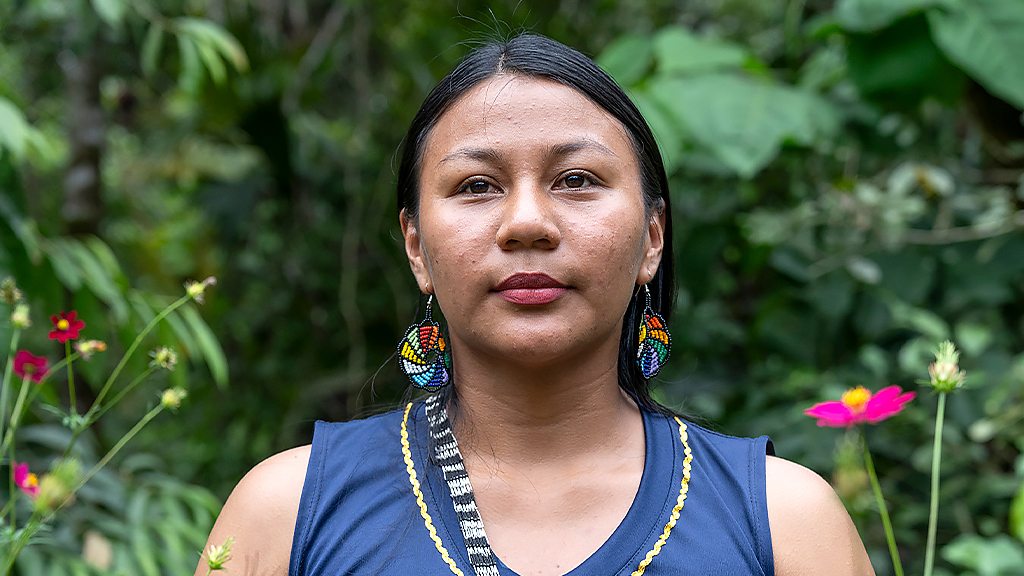
The Yuturi Warmi, an Ecuadorian patrol group, has vowed to protect their community's land in the Amazon Rainforest from the pollution of extractive industries – and their efforts appear to be working.
It is the break of dawn in the Serena community, in the middle of the Ecuadorian Amazon. Along the Jatunyacu River, which later joins the Amazon River in the Napo Province, Elsa Cerda, a 43-year-old indigenous Kichwa woman, brews guayusa leaves – a native plant from the rainforest – in a pot.
It marks the start of the Guayusa Upina, a ritual performed by Amazonian indigenous peoples before beginning their daily activities. This tradition is more than a routine; it's a spiritual connection to their ancestral roots.
As the first rays of light begin to filter through the tree canopy, a diverse assembly of 35 women, ranging from 23 to 85 years old, arrives one by one at the ceremony. The eldest among them, Corina Andy, who is fondly called "abuela", "the grandmother", leads them in a collective cleansing ritual using medicinal plants.
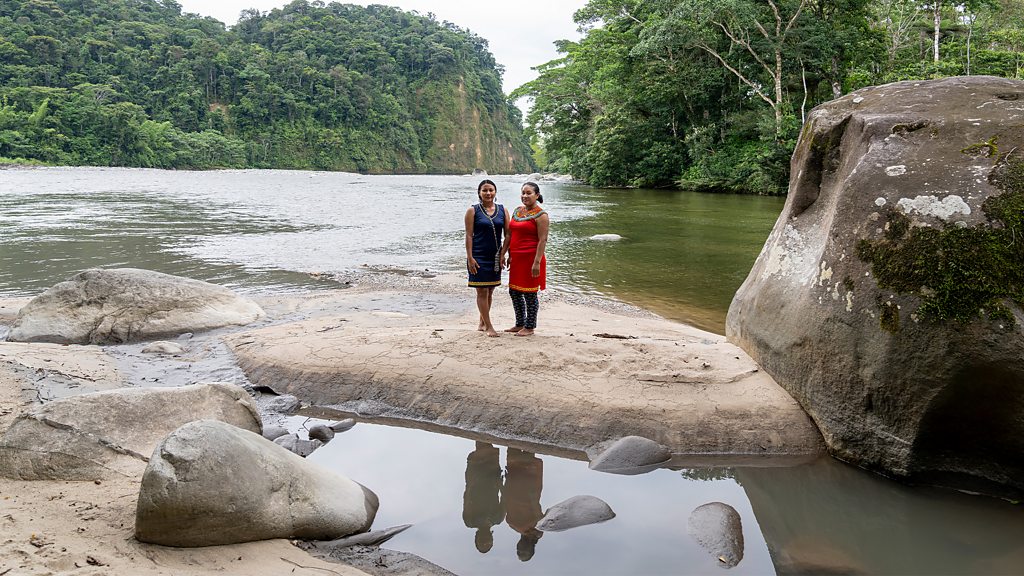
Leila Cerda and Elsa Cerda, leaders of the Serena community, stand by the Jatunyacu River, which is at the heart of their community (Credit: Ana Maria Buitron)
Meanwhile, the younger women chant and dance to traditional songs in their native language, Kichwa Napo.
More:
https://www.bbc.com/future/article/20240503-the-indigenous-women-fighting-mining-in-ecuadors-amazon
"Strength, strength!" Cerda shouts, and as the echo lingers, the women respond with "guard, guard!".
Indigenous leader's killer is convicted in Brazil, but tensions over land remain
by Sarah Brown on 7 May 2024

- Bar owner João Carlos da Silva was on April 15 sentenced to 18 years in prison for the murder of Indigenous land defender and teacher Ari Uru-Eu-Wau-Wau four years earlier.
- Ari’s murder became symbolic of the struggle land defenders in Brazil face when protecting their ancestral territories, including constant threats and sometimes deadly violence.
- The Uru-Eu-Wau-Wau Indigenous Territory faces fresh threats after a national lawmaker claimed its current boundaries are wrong and vowed to reduce the area in favor of local cattle ranchers and farmers.
- It’s one of several territorial setbacks that Indigenous lands across Brazil are currently facing; others include a territory in Paraná state whose demarcation process has been suspended, and one in Bahía state that could potentially be auctioned off.
On April 17, 2020, an Indigenous leader who fought to protect his ancestral land was violently killed in the Brazilian state of Rondônia. Almost exactly four years later, a local bar owner has been convicted and sentenced to 18 years in prison for Ari Uru-Eu-Wau-Wau’s murder. The ruling marks a rare case of justice for violence against Indigenous land defenders, even as conflicts over traditional territories in Brazil persist.
On April 15 this year, a court in Rondônia convicted João Carlos da Silva for double aggravated homicide of the Indigenous land defender and teacher — meaning the murder was intentional, the motive was frivolous, and defense was impossible for the victim. According to court records, Silva had offered Ari drinks at his bar until he became unconscious, before then killing him with blows to the neck and head and taking his body to a different location and leaving it by the side of a road in order to hinder the investigation.
The trial was broadcast live with the presence of several Indigenous people, including family members. Ari’s sister, Mandeí Uru-Eu-Wau-Wau, testified in the trial, calling her brother “a good boy who always defended our territory.”
The crime was originally thought to have been related to Ari’s work in land and environmental surveillance, but the Federal Police ruled out a link between the murder and land defense. Instead, they concluded that Silva knew Ari and killed him due to a dislike of the victim and being bothered by his presence.
More:
https://news.mongabay.com/2024/05/indigenous-leaders-killer-is-convicted-in-brazil-but-tensions-over-land-remain/


If you'll notice, in the video, it's mentioned the heavy violence by invaders in indigenous land that this particular brutal stuff started in 2016.
The progressive President, and Brazil's first woman President, Dilma Rousseff was viciously taken from office by Bolsonaro's hard-right, racist majority in the legislature in August, 2016, through filthy maneuvering. She was replaced quickly by Michael Temer, who opened fire symbolically by turning business loose on indigenous territory.
Two articles:
Brazil’s Dilma Rousseff: Impeachment is a coup
Vice president takes over as a defiant Dilma Rousseff, suspended for 180 days, vows to fight on.
13 May 2016
Brazil’s President Dilma Rousseff has addressed the nation in a defiant speech outside the presidential palace, calling a senate decision to suspend her for 180 days a coup.
Rousseff, 68, has been in office since 2011 and her suspension came hours after the senate voted 55-22 to put her on trial, a decision that ended more than 13 years of rule by the left-wing The Workers’ Party.
She said on Thursday that she was “a victim of a legal farce and a political farce”.
“When an elected president is suspended because of a crime she hasn’t committed, the name we give is not impeachment but a coup,” Rousseff said.
“I may have made mistakes but I did not commit any crime. The coup d’etat threatens to undo true victories of [the] last decade.”
More:
https://www.aljazeera.com/news/2016/5/13/brazils-dilma-rousseff-impeachment-is-a-coup
~ ~ ~
Brazil’s President Temer trashes Indian rights for personal political gain
July 21, 2017
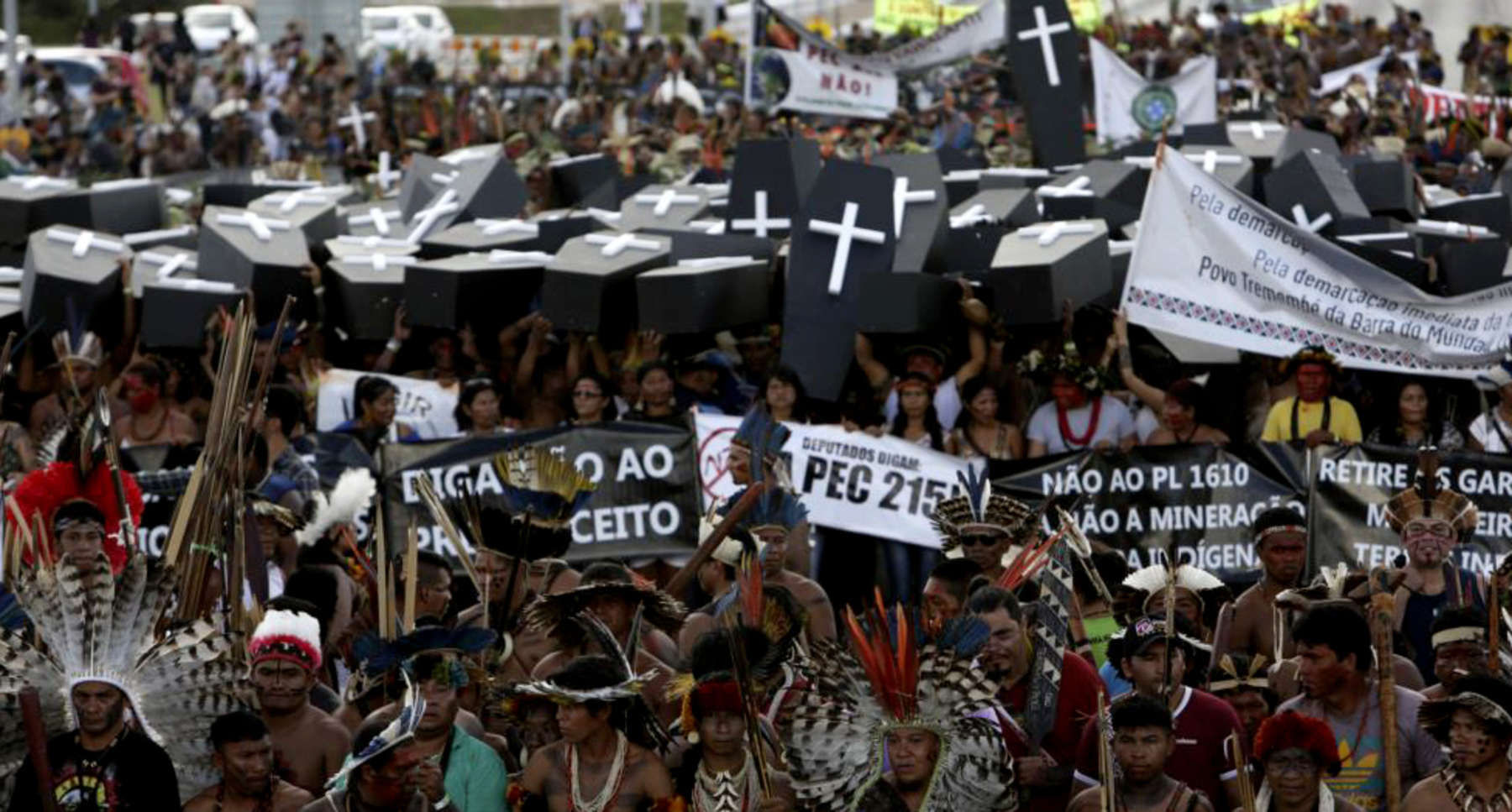
© VOA
Major indigenous protests in Brasilia against government’s attempts to weaken indigenous rights, May 2017 © VOA
This page was created in 2017 and may contain language which is now outdated.
The Brazilian President Michel Temer has accepted a controversial legal opinion which denies Indigenous people the right to their land, and made it official policy.
The opinion states that Indigenous peoples do not have the right to their land if they were not occupying it when the current constitution came into effect in October 1988.
The opinion contradicts the constitution, which clearly states that Indigenous peoples have the right to exclusively occupy and use the lands which they have inhabited since long before European colonization of the country.
Brazil’s federal prosecutor’s office and eminent jurists say that this is only an opinion, and has no legal status as well as being unconstitutional.
Joenia Wapixana, Brazil’s first female Indigenous lawyer said: “Our original rights are imprescriptible, so the time frame is unconstitutional.”
More:
https://www.survivalinternational.org/news/11754
Smothered by Seaweed: Sargassum Wreaks Havoc on Caribbean Ecosystems
Smothered by Seaweed: Sargassum Wreaks Havoc on Caribbean Ecosystems
Its growth driven to epic levels by climate change and fertilizer runoff, sargassum puts dozens of species — and people — at risk.
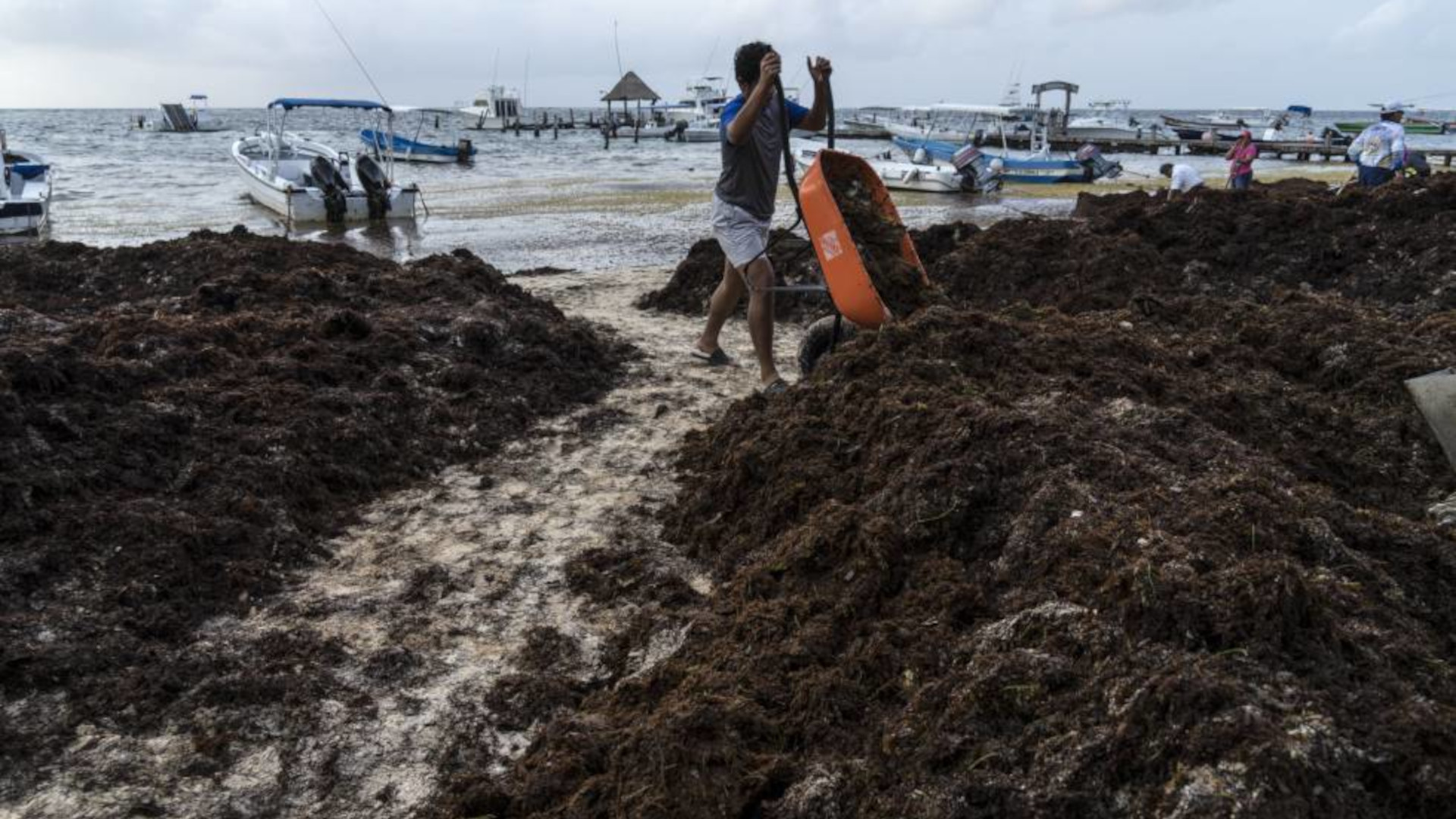
People picking up excess sargassum from the Mexican coast in the Mayan Peninsula. Photo by Gladys Serrano | El País
May 3, 2024 - by Maria Mónica Monsalve (América Futura, El País América) and Krista Campbell (Television Jamaica)
Originally published by Centro de Periodismo Investigativo with The BVI Beacon, The Virgin Islands Daily News, America Futura – El País América, Jamaica and the RCI Guadeloupe.
For more than 20 years, Mexican biologist María del Carmen García Rivas has led a crusade to protect the coral lining the Yucatan Peninsula in the Caribbean Sea. As director of the Puerto Morelos Reefs National Park in México, she has advocated for reforms to reduce runoff and other pollution from coastal development.
She has spearheaded efforts to control lionfish, an introduced species that has put at risk the nearly 670 species of marine fauna that inhabit the park. And since 2018, she has organized brigades to restore reefs damaged by tissue-destroying coral diseases known as white syndromes. But now, yet another threat has been keeping her awake at night: massive blooms of sargassum seaweed reaching the coast of the park.
“When the sargassum, a macroalgae that usually floats, reaches the coasts, it begins to decompose, generating an environment without oxygen that kills different organisms,” she said. “It mainly affects species that cannot move or move very little, such as some starfish, sea urchins, the sea grasses themselves, and of course corals.”
Along the coast of Quintana Roo, the Mexican state where the Puerto Morelos Reefs National Park is based, the local government collected 70 tons of sargassum during 2023 alone, said Huguette Hernández Gómez, the state’s Secretary of Ecology and Environment. Added to what they collected during the last four years, the figure reaches 200 tons.
Regional Problem
This story is familiar across the Caribbean. Though modest amounts of sargassum benefit marine life in the region, massive influxes arriving since 2011 have upset the ecological balance in some areas in ways that could be irreversible. Scientists blame the explosive growth of the seaweed on global pollution, climate change, and other international problems that Caribbean islands did little to cause and lack the political power to resolve.
More:
https://therevelator.org/smothered-by-seaweed/
Alternative Medicine An Orangutan Healed Himself With Medicinal Plant
By:
Dennis Thompson
Published on:
May 03, 2024, 6:04 am
Updated on:
May 03, 2024, 6:04 am
FRIDAY, May 3, 2024 (HealthDay News) -- Primates are capable of tending to wounds using medicinal plants, a new case report says.
A male Sumatran orangutan treated a facial wound with a climbing plant known to have anti-inflammatory and pain-relieving properties, researchers say in the journal Scientific Reports.
The orangutan, named Rakus by observers, plucked leaves from a vine called Akar Kuning (Fibraurea tinctoria) and chewed on them, researchers said.
Rakus then repeatedly applied the resulting juice onto his facial wound for several minutes, before fully covering the wound with a poultice formed by the chewed leaves, researchers said.
This is the first documented case of a primate applying a known naturally occurring medicinal substance to a wound, researchers said.
It indicates that the medical wound treatment people receive at home and in urgent care clinics might have arisen in a common ancestor shared by humans and orangutans, the research team says.
“The treatment of human wounds was most likely first mentioned in a medical manuscript that dates back to 2200 BC, which included cleaning, plastering, and bandaging of wounds with certain wound care substances,” researcher Caroline Schuppli, an evolutionary biologist with the Max Planck Institute of Animal Behavior in Germany, said in a news release.
More:
https://www.healthday.com/health-news/alternative-medicine/an-orangutan-healed-himself-with-medicinal-plant
~ ~ ~
Wounded orangutan seen using plant as medicine
1 day ago
By Georgina Rannard,
BBC Science reporter
A Sumatran orangutan in Indonesia has self-medicated using a paste made from plants to heal a large wound on his cheek, say scientists.
It is the first time a creature in the wild has been recorded treating an injury with a medicinal plant.
After researchers saw Rakus applying the plant poultice to his face, the wound closed up and healed in a month.
Scientists say the behaviour could come from a common ancestor shared by humans and great apes.
"They are our closest relatives and this again points towards the similarities we share with them. We are more similar than we are different," said biologist Dr Isabella Laumer at the Max Planck institute in Germany and lead author of the research.
A research team in the Gunung Leuser National Park, Indonesia spotted Rakus with a large wound on his cheek in June 2022.
They believe he was injured fighting with rival male orangutans because he made loud cries called "long calls" in the days before they saw the wound.
More:
https://www.bbc.com/news/science-environment-68942123
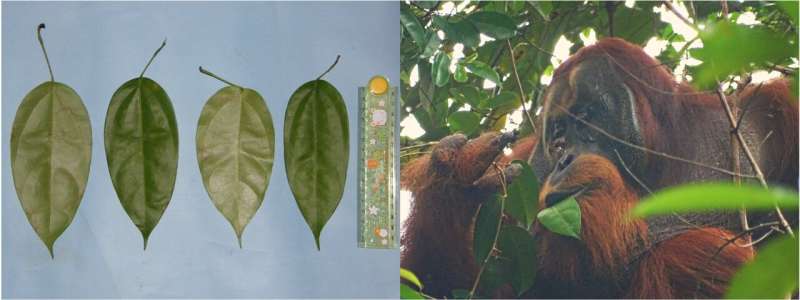
Rakus.
Bukele's Anti-Corruption Smokescreen

Tuesday, April 30, 2024
El Faro Editorial Board
Leer en español
Salvadoran police have announced the arrest of presidential commissioner Cristian Flores Sandoval on charges of corruption. According to the Attorney General’s Office, Flores offered state contracts in exchange for money. President Nayib Bukele, in the middle of his presidential “leave of absence” until June 1, wrote on X that the commissioner was neither the first nor the last official to face accountability for acts of corruption. Media outlets around the world, including the L.A. Times, Deutsche Welle, and France 24, reported the commissioner’s arrest and the president’s words. The trick worked.
Spanish newspaper El Mundo was even more generous, arguing in an article on the incident that the war against corruption announced by Bukele had “paid off” with the arrest of Flores.
His prosecution is good news for the country, assuming that the Attorney General’s Office can prove the accusations of corruption leveled against the now ex-commissioner. If he did in fact orchestrate a corruption scheme, his arrest is a positive step and he should face justice for his abuse of power. Corruption is, and has long been, one of El Salvador’s biggest problems.
A real fight against corruption, however, must begin with the fundamentals: a robust rule of law, judicial independence, and government transparency, which is to say, precisely those mechanisms that Bukele and his loyalists have spent the past five years destroying. What we are witnessing is not a fight against corruption.
If Bukele, his attorney general, and his police had fighting corruption on their agenda, the government would be purged from bottom to top. On the contrary, the function of El Salvador’s top prosecutor is to protect the corrupt and enable corruption for the home team. Commissioner Cristian Flores Sandoval has not been arrested for corruption.
More:
https://elfaro.net/en/202404/opinion/27318/bukele-rsquo-s-anti-corruption-smokescreen
Reporter recounts covering El Salvador's civil war The Biblio File

“El Salvador: Blood On All Our Hands” by George Thurlow. (Contributed)
By DAN BARNETT | Book Columnist
April 30, 2024 at 3:30 a.m.
With the approval of Ken Leake, publisher of the Woodland Daily Democrat, George Thurlow would take vacation time to report from one of the world’s hotspots — El Salvador. He arrived there on April 26, 1981.
Thurlow, editor of the Chico News & Review from 1981-1991, now living in Santa Barbara, spent only a few days in El Salvador during its civil war. Looking for the “bang bang,” the only way to get attention from news outlets back home, Thurlow and his translator, Gilberto Moran, were ambushed by the ruthless Treasury Police. Thurlow was wounded but Moran was killed. The Salvadoran police, Thurlow writes, “shoot first and don’t ask questions later.”
“El Salvador was in the throes of a civil war between the Farabundo Marti National Liberation Front, which fought to end government repression and for land reform, and an authoritarian government.” Weeks after Ronald Reagan was elected U.S. president in 1980, four U.S. religious figures, including three nuns, were raped and killed by Salvadoran soldiers. Meanwhile, Thurlow notes, the U.S. increased support for the government in its proxy war against the Soviets.
. . .
Much of the book recounts Thurlow’s agonizing but fruitless search for Moran’s grave and his family. “Like so many other Americans,” he writes, “I had come to El Salvador to make a point, and I was leaving behind a trail of misery. I had stories to tell … and a clear understanding of how the U.S. was behind so much of the terror. But it would take me 20 years to figure out my responsibility. My country never has.”
More:
https://www.chicoer.com/2024/04/30/reporter-recounts-covering-el-salvadors-civil-war-the-biblio-file/
A Guatemalan genocide trial echoes among South Florida's Ixil Maya
WLRN 91.3 FM | By Tim Padgett
Published May 1, 2024 at 6:00 AM EDT
- click link for image -
https://tinyurl.com/299jkm68
Indigenous Defiance: Ixil Maya women in 2014, in the western Guatemalan town of Nebaj, carry the coffin of an exhumed villager, killed during a military massacre there in 1982, to a new burial site.
A genocide trial has been underway in Guatemala since April 5 — and although Pedro Brito Matom says it's too dangerous now for him to attend it, he takes consolation in knowing he helped bring the historic case to court.
Brito, who lives in Lake Worth Beach, is an indigenous Ixil Maya from the town of Nebaj in Guatemala’s western highlands. He was four years old in April of 1982, during the worst days of Guatemala's 36-year-long civil war, when he says soldiers came to his family’s house late one night.
They wanted to kill Brito’s father, Miguel, whom Pedro says they falsely accused of being a leftist guerrilla. The father wasn’t there, but Brito's two uncles were. So he says the soldiers murdered them instead. “They slashed their throats with knives, right in front of me,” Brito recalls, his voice softly choking. “I was just a little boy, but I remember watching the blood spill out of my uncles.”
Now 46, Brito still has a cherubic face — but a determined mind. He later defied army threats and located the mass grave where he says soldiers buried his uncles, named Jacinto and Diego Matom. He then decided to help other Ixil Maya exhume murdered relatives and give their survivor testimonies. “Their plan was to exterminate us as a people,” Brito says of the Guatemalan military of that time. “And we wanted it known that one person was most responsible.”
More:
https://www.wlrn.org/americas/2024-05-01/guatemala-indigenous-ixil-maya-genocide-lucas-garcia-florida-lake-worth
Supreme Court Puppetmaster's Consulting Firm Clients Exposed in Leak
Story by Andrew Perez and Adam Rawnsley • 22h • 5 min read
The consulting firm led by Leonard Leo, the architect of the Supreme Court's conservative supermajority, has worked for billionaire Charles Koch's political advocacy network and a dark money group that is currently arguing a Supreme Court case designed to preempt a wealth tax, according to documents obtained by Rolling Stone. The firm even worked to promote a book by Donald Trump cronies Corey Lewandowski and David Bossie.
Leo has played a central role in shifting the high court and its decisions far to the right. As former President Donald Trump's judicial adviser, Leo helped select three of the Supreme Court's six conservative justices. He also leads a dark money network that boosted their confirmations, and helps determine what cases the justices hear and shape their rulings.
The Supreme Court connection has paid off for Leo - big time. In 2021, he was gifted control of a $1.6 billion political advocacy slush fund. Over the past decade, Leo's dark money network has plowed more than $100 million into his for-profit consulting firm, CRC Advisors.
Leo co-chairs the Federalist Society, the conservative lawyers network. He is also the chairman of CRC. Like many consulting firms, CRC does not publicly disclose its clients. However, several of the firm's clients were named in resumes that applicants submitted to an online jobs bank hosted by the Conservative Partnership Institute, which accidentally left the files exposed online.
More:
https://www.msn.com/en-us/news/politics/supreme-court-puppetmaster-s-consulting-firm-clients-exposed-in-leak/ar-AA1nShyB
Right-wing media figures are citing a Spanish-language flyer of dubious origin as evidence that Democrats are importing
Right-wing media figures are citing a Spanish-language flyer of dubious origin as evidence that Democrats are importing new voters to “rig” electionsWRITTEN BY JACK WINSTANLEY
PUBLISHED 04/19/24 12:41 PM EDT
Right-wing figures — and even some GOP politicians — shared social media posts from the Heritage Foundation’s Oversight Project that pushed dubious claims about Spanish-language flyers in Mexico, which they claimed were encouraging asylum-seekers to vote for President Joe Biden once they arrive in the United States. In reality, there are virtually no cases of noncitizens voting in U.S. elections, and the flyer's origins are questionable.
- Citing right-wing site Muckraker.com, the Heritage Foundation’s Oversight Project posted an image of a Spanish-language flyer allegedly found at a humanitarian aid center in Matamoras, Mexico, and claimed that it asked asylum-seekers to “vote for President Biden when you are in the United States.” The dubious flyer appears to be printed on a Resource Center Matamoros letterhead and offers asylum-seekers legal help through its partner organization, the Hebrew Immigrant Aid Society. After describing the services it offers, the letter seemingly veers into the political: “Reminder to vote for President Biden when you are in the U.S. We need four more years of his mandate to remain open.” The Oversight Project also provided video purporting to show the flyers posted in nearby port-a-potties. [Twitter/X, 4/15/24, 4/15/24]
- Resource Center Matamoros founder Gaby Zavala told The Associated Press that she did not know who made the flyer and that her aid organization “does not encourage immigrants to register to vote or cast ballots in the U.S.” The AP's analysis of the flyer noted that it “contained errors in spelling and grammar, and appeared to include verbatim paragraphs from the organization’s English-language website that were translated into Spanish using online translation software." [The Associated Press, 4/17/24]
- Even Fox News national correspondent Bill Melugin said he was “extremely skeptical” of the flyer, which he said “appears to be a word for word Google Translate copy & paste of a portion of the NGO's English website, with ‘vote for Biden’ randomly added in at the end.” [Twitter/X, 4/16/24, 4/16/24]
More:
https://www.mediamatters.org/immigration/right-wing-media-figures-are-citing-spanish-language-flyer-dubious-origin-evidence
Profile Information
Member since: 2002Number of posts: 160,663